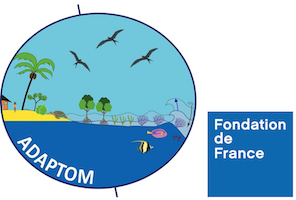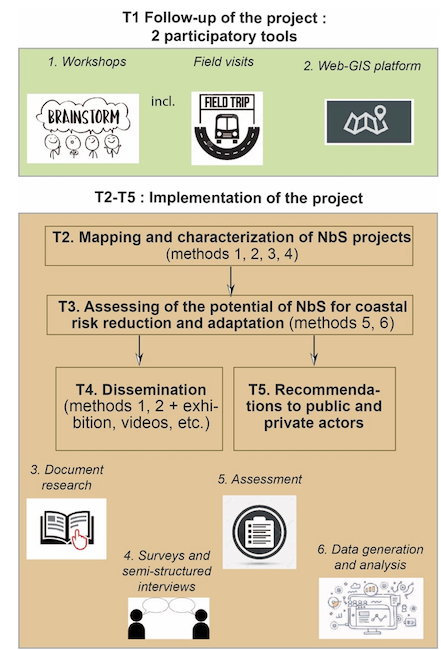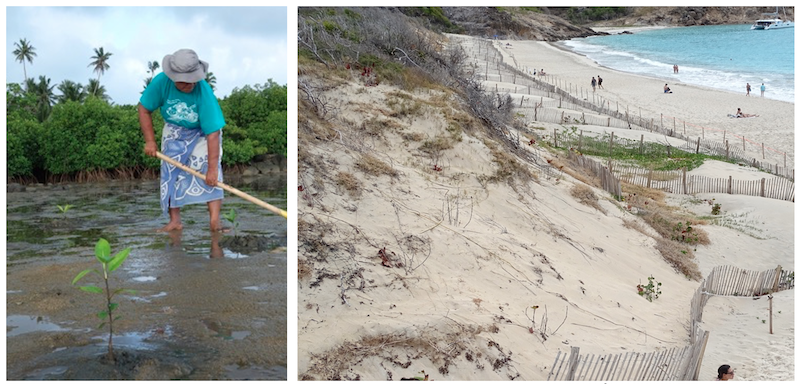ADAPTOM

ADAPTOM – Lessons learnt from nature-based solutions for coastal risk reduction and climate change adaptation in French Overseas Island Territories
Call for projects Littoral, Fondation de France (2022-2024)
- General coordinator of the project: Prof. Virginie Duvat, LIENSs
- Funding partners: Fondation de France, Call for Projects The Future of Coasts and Oceans:
This call for projects funds participatory projects.
ADAPTOM addresses two axes of this call for projects: Anticipate and adapt to climate change impacts & Think and care for nature in coastal and marine environments
- Partners:
ADAPTOM gathers 5 scientific partners with complementary backgrounds in environmental law, geomatics, geography of environment, social geography, anthropology of disasters, marine ecology, terrestrial ecology, and numerical modeling: LIENSs (Littoral, Environment and Society, La Rochelle), which coordinates the project and hosts its web-GIS, and brings to the project skills in coastal geomorphology and management of tropical environments and its experience in risk reduction and climate adaptation assessment; CRIOBE (Research Center on Islands and Observatory of Environment, French Polynesia), based on its skills in marine ecology and assessment of ecosystem services; ENTROPIE (Tropical Marine Ecology of the Indian and Pacific Oceans, New Caledonia), involved in numerical modelling of the coastal protection service provided by marine ecosystems; GEODE (Center of Research in Geography, Development and Environment; Martinique), based on its expertise in coastal development and coastal risk management in the Caribbean region, and its collaboration with Caribbean stakeholders; and LAPSCO (research laboratory in social and cognitive psychology, Clermont-Ferrand), with an anthropologist contributing to the assessment of the social acceptability and governability of NbS projects, including the use of local and scientific knowledge for their implementation
Participants :
CRIOBE : Joachim Claudet, Laëtitia Hédouin
ENTROPIE : Maxime Duphil, Christophe Menkès
GEODE : Pascal Saffache
LAPSCO : Maëlle Callandra
LIENSs : Frédéric Pouget, Natacha Volto, Lucile Stahl, Agnès Michelot
Origin of the ADAPTOM Project:
The webinar organized by the French Coastal Conservatory (October 2020) about climate change adaptation in French overseas territories involved more than 150 participants from overseas territories and mainland France, including state services, regional governments, deputies and senators, researchers, and NGOs and local associations. During this webinar, one working group addressed nature-based solutions aimed at containing coastal risks, based on the presentation of experiments implemented in Guadeloupe, Saint-Martin and Guyana. A consensus view emerged among participants, who expressed their preference for nature-based solutions (NbS) vs. hard engineering to reduce current and future coastal risks.
However, participants emphasized that:
– They did not have yet the benefit of hindsight to say whether NbS were the right course of action or not, and therefore needed to learn lessons from existing experiments.
– Their need for (i) networking at the scale of French overseas territories, (ii) having an inventory of implemented NbS, and (iii) having shared assessment methods.
– The major importance of considering and reactivating traditional (incl. ancestral) practices that have proved to be effective.
ADAPTOM addresses these needs based on a strong collaboration with concerned and already engaged stakeholders. The organization and follow-up of ADAPTOM relies on the organization of 8 workshops: a launch workshop, 6 topical cross-region workshops combining room work and field visits, and a closure workshop.
The ADAPTOM Project:
ADAPTOM focuses on settled French overseas island territories (Guadeloupe, Martinique, Mayotte, New Caledonia, French Polynesia, Reunion, Saint-Martin, Saint-Barthélemy, Wallis and Futuna) and addresses five key questions: Which types of NbS have already been implemented to date? Did NbS experiments generate benefits for climate adaptation, especially through individual and collective learning? Were their benefits (incl. learning, networking, etc.) shared and highlighted? Does regional cooperation (at the scale of each ocean basin) contribute to NbS development? How can scientists usefully assist local stakeholders in NbS experimentation and implementation?
ADAPTOM addresses these questions using two complementary participatory tools:
(1) The co-building, by scientists and concerned stakeholders, of a collaborative geo-visualization tool, which will take the form of a shared web-GIS platform.
(2) The organization of virtual and face-to-face workshops in the three ocean basins where French overseas island territories are located (Caribbean region, and Indian and Pacific Oceans).
ADAPTOM comprises four main tasks (T2 to T5):
T2 consists in mapping NbS projects and producing a catalogue of NbS, which will be delivered in two formats, including hard-copy and digital (web-GIS platform).
T3 focuses on assessing the potential of NbS for reducing coastal risks and promoting coastal adaptation. NbS experiments will be analyzed based on an interdisciplinary approach considering a set of variables, including technical effectiveness, social acceptability, governability, funding of NbS projects, as well as their benefits and dis-benefits, and the extent to which they promote knowledge sharing. This assessment will allow us to identify ways for progress and lead to the production of a Methodological Guide. The results of the assessment will be included into the web-GIS platform.
T4 is dedicated to the dissemination of results among concerned stakeholders, the civil society, Master students and the scientific community, through the media, the realization of documentaries and videos and an exhibition which will take place in French overseas territories and in Paris.
T5 aims at formulating concrete recommendations to assist public and private actors in coastal climate adaptation using NbS. This task relies on the organization of a closure workshop, the presentation of ADAPTOM results to the French National Assembly and French Senate and making concerned stakeholders aware of existing jurisdictional tools supporting the implementation of NbS. We will also assess the extent to which existing jurisdictional tools are appropriate or not to support NbS experimentation and implementation.

Main expected results:
- Design of a new categorization of NbS} and coastal risk reduction and adaptation responses more generally, with the production of a ‘catalogue of coastal risk reduction and adaptation solutions.
- Mapping and characterization of NbS in French overseas island territories, and comparison with NbS projects used in neighboring countries and territories, with the production of a synthetic document presenting NbS projects, and dissemination of results through the web-GIS platform.
- Assessment of NbS and analysis of the levers and barriers to their implementation and success in French overseas island territories, with the production of an Assessment Guide and dissemination of results through the web-GIS platform.
- Organization of exhibitions in French overseas territories and in Paris.
- Realization of videos and documentaries to be disseminated through the French overseas TV and partners’ web sites.
- Written summary of jurisdictional analysis for national decision-makers.




